There is an amazing number of novels and other books written by former AML Award winners being published in 2018. 2017 was a great year for Mormon literature–the judging for the 2017 AML Awards are in full swing, and the winners will be announced at the Mormon Studies in the Humanities Conference that AML is participating in on March 23. You had better get to reading the 2017 books now, however, because the first half of 2018 may very well top what we are seeing this year. They include:
Novels
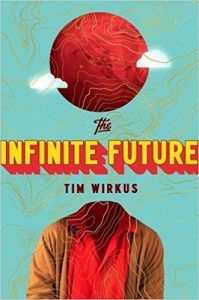 Tim Wirkus (Novel Award, 2014). The Infinite Future. Penguin Press, Jan. 16.
Tim Wirkus (Novel Award, 2014). The Infinite Future. Penguin Press, Jan. 16.
A mindbending novel that melds two page-turning tales in one. In the first, we meet three broken people, joined by an obsession with a forgotten Brazilian science-fiction author named Salgado-MacKenzie. There’s Danny, a writer who’s been scammed by a shady literary award committee; Sergio, journalist turned sub-librarian in São Paulo; and Harriet, an excommunicated Mormon historian in Salt Lake City, who years ago corresponded with the reclusive Brazilian writer. The motley trio sets off to discover his identity, and whether his fabled masterpiece–never published–actually exists. Did his inquiries into the true nature of the universe yield something so enormous that his mind was blown for good? In the second half, Wirkus gives us the lost masterpiece itself–the actual text of The Infinite Future, Salgado-MacKenzie’s wonderfully weird magnum opus. The two stories merge in surprising and profound ways. Part science-fiction, part academic satire, and part book-lover’s quest, this wholly original novel captures the heady way that stories inform and mirror our lives.
Publishers Weekly review. Kirkus review. Booklist review (starred).
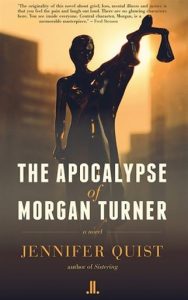 Jennifer Quist (Novel Award, 2015). The Apocalypse of Morgan Turner. Linda Leith, March 10.
Jennifer Quist (Novel Award, 2015). The Apocalypse of Morgan Turner. Linda Leith, March 10.
Morgan Turner’s grief over her sister’s brutal murder has become a run, and everyday horror she is caught in along with her estranged parents and chilly older brother. In search of a way out, she delves the depths of a factory abattoir, classic horror cinema, and the Canadian criminal justice system, which is trying her sister’s killer and former lover. He is arguing that he is Not Criminally Responsible for his actions because of mental illness. Whatever the verdict, Morgan – with the help of her immigrant coworkers, a Mormon do-gooder, and a lovelorn schizophrenia patient – uncovers her own way to move on.
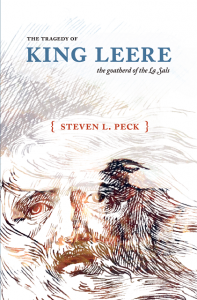 Steven L. Peck (Novel Award, 2011, Short Story Award, 2014). The Tragedy of King Leere, Goatherd of the La Sals. BCC Press, Spring. [POSTPONED: 2019]
Steven L. Peck (Novel Award, 2011, Short Story Award, 2014). The Tragedy of King Leere, Goatherd of the La Sals. BCC Press, Spring. [POSTPONED: 2019]
A novel reconnoitring a future climate change catastrophe in Utah’s own La Sal Mountains, and told faithfully by a daemon full of sound and fury and signifying a wry sense of sage perspicacity (and who has abandoned the war of good vs. evil to become an omniscient narrator) . . . It has everything that you would expect from Steve–quirky characters, intense irony, actual science (it is a parable about the effects of climate change, after all), and battle robots, Plus, it is Shakespeare. Actual Shakespeare. Except for the battle robots, which are at least the most Shakespearean battle robots in the history of either Shakespeare or battle robots.
George B. Handley (Memoir Award, 2010). American Fork. Roundfire, May.
A shared love of the Utah landscape heals family wounds for two unlikely friends. Zacharias Harker is a brilliant botanist and an aging recluse. Haunted by his mistakes and living without his wife and daughter for the past twenty years, he hatches the idea to 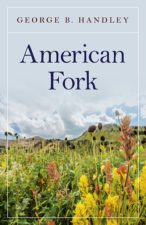 write his magnum opus, a book on the implications of climate change for humanity focused on the wildflowers of Utah’s Wasatch Mountains. Just prior to the tragedy of 9/11, he hires a young woman, Alba, to paint flowers for the book. Over the course of their unlikely friendship, Harker convinces Alba to return to Chile to learn the story, long hidden from her by her mother, of her father’s disappearance under Pinochet. Alba’s discovery of her family history and her experience listening to the stories of Chileans who have resisted a government ruled by fear inspire her return to Utah with renewed purpose. As America grows more distrusting of diversity, Alba commits her art to the protection of the environment and to a more inclusive meaning of family and belonging while she and her husband, John, strive to learn Harker’s hidden past and include him in their lives before it is too late. Rooted in the Mormon heritage of Utah but hemispheric in its reach, American Fork is a story of restoration and healing in the wake of loss and betrayal.
write his magnum opus, a book on the implications of climate change for humanity focused on the wildflowers of Utah’s Wasatch Mountains. Just prior to the tragedy of 9/11, he hires a young woman, Alba, to paint flowers for the book. Over the course of their unlikely friendship, Harker convinces Alba to return to Chile to learn the story, long hidden from her by her mother, of her father’s disappearance under Pinochet. Alba’s discovery of her family history and her experience listening to the stories of Chileans who have resisted a government ruled by fear inspire her return to Utah with renewed purpose. As America grows more distrusting of diversity, Alba commits her art to the protection of the environment and to a more inclusive meaning of family and belonging while she and her husband, John, strive to learn Harker’s hidden past and include him in their lives before it is too late. Rooted in the Mormon heritage of Utah but hemispheric in its reach, American Fork is a story of restoration and healing in the wake of loss and betrayal.
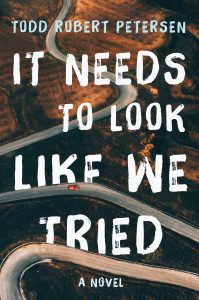 Todd Robert Peterson (Novel Award, 2009). It Needs to Look Like We Tried. Counterpoint Press, May.
Todd Robert Peterson (Novel Award, 2009). It Needs to Look Like We Tried. Counterpoint Press, May.
Everyone has a dream, an idea, a goal. But what happens when those desires are thwarted, when dreams and goals fall apart? In It Needs to Look Like We Tried, Todd Robert Petersen explores the ways in which our failures work on the lives of others, weaving an intricate web of interconnected stories. A fastidious man takes a detour on the way to his father’s wedding and kicks off a series of events that ricochets from the bride to her real estate clients; to a crazed former homeowner and his sister-in-law’s reality TV lover; to a hoarding family whose lives are wrecked by their appearance on the second-rate show. Their daughter decides to escape the gravity of her tiny town with the help of her boyfriend who has a not-quite-legal plan to scrape together enough money to fund their departure. On their way across the country, these star-crossed lovers encounter our fastidious man, and the Rube-Goldberg machine of life continues. Their fling has petered out, and they are driving home, whatever home is left after walking away from everything they abandoned a month before.
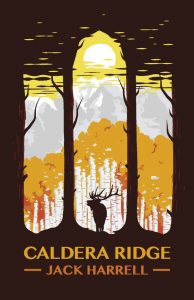 Jack Harrell (Novel Award, 2008, Short Story Award, 2010, Criticism Award, 2016). Caldera Ridge. Signature, July.
Jack Harrell (Novel Award, 2008, Short Story Award, 2010, Criticism Award, 2016). Caldera Ridge. Signature, July.
Kail Lambert spends the summer after high school graduation traveling the country, hoping to make it all the way to San Francisco before returning home to Illinois. However, a broken motorcycle leaves him stuck in Idaho, where he surprises himself by falling in love with the mountains and the local culture. He converts to Mormonism and marries Charlene Simmons—a perfect Mormon girl deeply dedicated to her church. After a fifteen-year hiatus in Arizona, Kail moves his family back to Idaho to solve some unresolved issues between his wife and God. What he and Charlene find are shocking surprises beneath the surface of every beautiful thing, from the Idaho mountains to Charlene’s deceptively devout family. Acclaimed author Jack Harrell creates a world of complex and troubled characters, each seeking happiness from a God simultaneously familiar and mysterious, each wrestling with the doubts and eternal optimism integral to their faith.
Mary Clyde (Short Fiction Award, 1999). No Morning Sun. Tin House, Fall.
The Wilson family’s world is indisputably transformed on a fall evening in the Arizona desert outside of Phoenix. Jack flips his SUV —that much is certain. To him an enormous light elbows out the black sky with a gold, purple, gray cloud. Mushroom beauty. Jack’s parents’ world deviates from Jack’s when they find their son hospitalized in a coma —a man who is Jack but no longer Jack. In a literary tour de force in the tradition of Cormack McCarthy’s The Road, the reader discovers the patient’s mind is not totally at rest. In Jack’s dream world, the Wilson family is fleeing the contaminated city in the aftermath of a nuclear bomb explosion. Meanwhile on a different plane, his parents cope with his catastrophic injuries in the hospital. These divergent worlds are not as contradictory as they seem and blend to inform each other, drawn together and bound by the fierce love and loyalty of the Wilson family.
Short story collection
Matthew James Babcock (Poetry Award, 2016). Future Perfect. Engine/Ferry Street Books, Fall.
Poetry collections
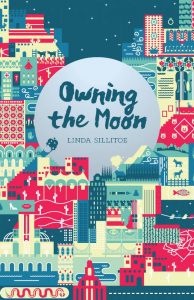 Linda Sillitoe (AML Awards in 1977, 1980, 1981, 1987, 1993). Owning the Moon. Signature, January.
Linda Sillitoe (AML Awards in 1977, 1980, 1981, 1987, 1993). Owning the Moon. Signature, January.
The final poetry collection by Linda Sillitoe, whose deceptively simple verses explore the complex themes of motherhood, ambition, faith, gender, and mortality.
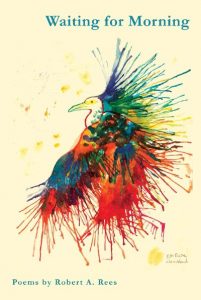
Robert A. Rees (Poetry Award, 1981, and an AML founder). Waiting for Morning. Zarahemla, December 2017.
Stirred to fullness and passion by life’s abundance, Whitman sang, “I will go to the bank by the wood and become undisguised and naked, / I am mad for it to be in contact with me.” His “it,” of course, is the world, beat- ing and breathing all around him. Bob Rees exhibits a similar madness in Waiting for Morning: a madness to be in contact with life in its many manifes- tations, to hold it close, and to be nourished by that closeness. Stripped of pretension, Rees’s poems lay bare a mind exposed to his physical, cultural, and spiritual environments. They show him in celebration and grief, deep longing and joy, but always basking in words.—Tyler Chadwick
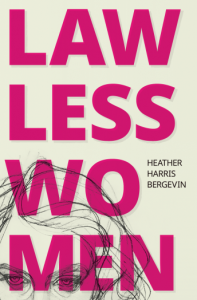 Heather Harris Bergevin. Lawless Women. BCC Press, January 2018.
Heather Harris Bergevin. Lawless Women. BCC Press, January 2018.
In these poems, we encounter some of the “bad girls” from literature and history: Medea, Helen of Troy, Vashti, Gothel (Rapunzel’s witchy mom), Snow White’s stepmother, and la belle dame sans merci. But we get to hear their side of the story, all processed through the marvelous mind of one of Mormonism’s most unique and engaging poetic talents.
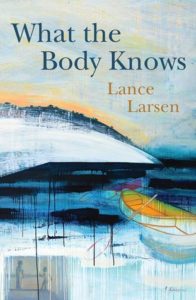 Lance Larsen (Poetry Award, 2005, 2009). What the Body Knows. University of Tampa Press, May 2018.
Lance Larsen (Poetry Award, 2005, 2009). What the Body Knows. University of Tampa Press, May 2018.
A new collection of prose poems from the former Poet Laureate of Utah.
After our argument, my beloved fled to the flea market. Upon returning, she said, “I still love you. Here’s a door.” Picture a storm door, heavy gauge aluminum, shrunk to 28 by 22 inches and attached to a frame—what she offered in lieu of a make-up kiss . . . . A shower is a door between clean and cleaner. Belief is a door you lay down in a graveyard whereby dead aunts climb out of the dirt. A bed at midday is a door between two people who touch and trade breaths and burn late and exit their bodies like vapor . . . . A cat is a door we keep around the house to remind us we once preferred the world of animals. Morning has come. My door, which is now our door, leans against the wall the way shadows lean into the next life. My cat passes through this practice portal to prove she is still here. I get down on all fours, a rehearsal. I have doors all over my body—open them.
—From “Doors” in What the Body Knows
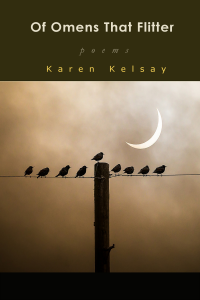 Karen Kelsay (Poetry Award, 2012). Of Omens that Flitter. Bit Table Publishing, February.
Karen Kelsay (Poetry Award, 2012). Of Omens that Flitter. Bit Table Publishing, February.
Kelsay’s third full length book of lyric poetry, Of Omens That Flitter, is a moving collection of new and selected poems, both in form and in free verse, showcasing the musicality, care, and craftsmanship that have become the hallmark of the author’s work. The shifting courses setting the tone in the opening sonnet reappear throughout, and provide the reader with deeply spiritual meditations on the theme of change—from youth to old age, from life to death, from summer to winter, from doubt to belief. The touching poems about her family, her travels, her faith, and her life in California and in England are infused with wisdom and humor, enhanced by an inspired and graceful combination of plainspoken language and striking sensual imagery. –Catherine Chandler
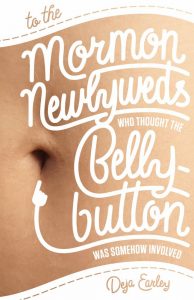 Deja Earley. To the Mormon Newlyweds Who Thought The Bellybutton Was Somehow Involved. Signature, August.
Deja Earley. To the Mormon Newlyweds Who Thought The Bellybutton Was Somehow Involved. Signature, August.
Poetry embracing the contradictions, joys, and occasional frustrations of a effortlessly funny and deeply thoughtful Mormon woman. The opening poem in this unique collection features a little girl delighted by a beach vendor’s jewelry. She is unaware that her favorite earrings in his case—a pair of bowtied bunnies—symbolize the Playboy empire. The poems that follow hold echoing tensions: innocence, experience, sexuality, faith, and the uneasy bedfellows made when they all collide. That collision expresses the friction the speaker feels as she adheres to and expands the confines of her faith. From awkward first kisses shared on a church couch to refusing to talk to men who are not Mormon, her poems remain funny, wry, and thoughtful. Despite the promise to steer clear of non-Mormon men, the final poems detail her marriage to a Catholic husband who offers Hail Mary prayers after a lost pregnancy while she struggles to find comfort from a Mother in Heaven. And despite the couples’ differences and moments of heartache, they thrive, allowing themselves to “imagine [they’re] floating in bright bubbles of light.” It is an emotional roadmap for anyone else familiar with such tensions, joys, and accommodations.
Criticism
Christopher Wei, editor. Mormonism and the Movies. BCC Press, Fall.
Also coming in 2018 from BCC Press will be a memoir and a collection of short stories, the details of which have not yet been released.

I’m curious: Is it too late to suggest another work for award consideration?
Not at all. Please suggest away.
.
Wow. 2018 looks great.
I’m not sure what’s on your list for the 2017 Poetry Award, but are you considering Merrijane Rice’s *Messages on the Water*, published in October? https://www.amazon.com/gp/aw/d/138725071X/
We got it. Thanks!